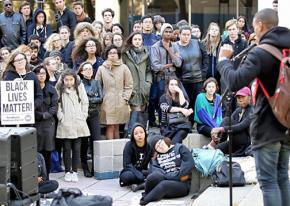Confronting racism at Fordham
reports on the racial polarization that the Black Lives Matter movement faces at Fordham University--and the efforts of Black students to push ahead.
CURA PERSONALIS is the Latin phrase that Fordham University uses to explain its commitment to the education of the whole person. This commitment is meant to express the institution's desire to cultivate each student's personality, values and vision of the world during her undergraduate studies.
Like other Jesuit institutions, Fordham views its mission as the encouragement of young people to see university study not only as their means of getting a job after college, but as a place to flourish as a human being. But after several recent racist acts and a hate crime on the Fordham campus, it is clear that the university is falling short of ensuring that students of color have a place to learn and flourish free of harassment.
Early in the fall semester, a Black undergraduate student returned home to his dorm room and found the n-word scratched into his door. Twice, around the same time, according to the campus newspaper, students found a backwards swastika and another "white supremacist reference" etched inside a restroom at the Lowenstein Center of Fordham's Lincoln Center Campus.

More recently, a video was made public of white Fordham students at a party chanting "white power!" over and over again at an off-campus party.
Amidst the repugnant feeling that Fordham students are neither safe nor free of racist intimidation and fear, we have to ask why this year has brought on these incidents of blatant racism.
Certainly the rise nationally of the Black Lives Matter movement has brought a sharper focus to incidents of police brutality and racism, both in communities and on campuses. But it appears that renewed activism around racial justice issues is also provoking a racist backlash among some whites, including college students.
The Fordham incidents, which University President Joseph M. McShane has acknowledged as "a kind of terrorism", can be viewed in this context. It should first be understood, however, that students of color at Fordham have been active in the fight against racism on their campus for a while.
For example, ASILI, the Black Student Alliance at Fordham's Black Student Alliance, produced a music video at the beginning of the fall semester parodying artist Asher Roth's "I Love College" song, sending their "I Hate College" version to the university as a whole.
The video, which features sympathetic white classmates playing ridiculous "bourgie" students obliviously playing beer pong while their fellow Black student is socially isolated, expresses anger and frustration with being a Black student at Fordham and describes the many obstacles Black students face just trying to go about their lives.
As ASILI's president Hans Appolo wrote in an essay this past September:
Being mistaken for a 'local' on the streets by people you see every day on campus, being stopped by security when walking onto school property even if your white friends get on no problem, and finding out a certain demographic of people are antsy dating you because of what their parents might think are just a few of the micro-aggressions a Black student could face any given day.
WHILE FORDAM has been in the Bronx since the 19th century, the neighborhood and the university have in several ways not aged well together. The campus is located in the Fordham neighborhood, a primarily Latino and Black community, and there is little interaction with the neighborhood within university culture. Commuter students from the area are few, and it is a general complaint of Fordham's more conscientious students that opportunities for community outreach are lacking.
The students who come to the Bronx to experience New York City realize very quickly that they are getting a different perspective than their counterparts at the Lincoln Center campus in Manhattan. They see the real New York City, the one that is obviously unequal and underserved.
The class divisions between the mostly white Fordham students and their surroundings can be either a fuel for activism and education that benefits the community in some way, or it can be a blind spot that the private school chooses to keep in the background. Even though the administration has by and large chosen the latter option, some students are beginning to take a different route by creating an anti-racist political and intellectual culture on campus.
Last March, for example, the Fordham Undoing Racism Collective hosted a community organizing workshop in which people came to discuss and strategize about how to move forward in promoting racial justice events over the long term. The event took place during a "Week of Reflection on Race Relations in America" that included a mass and liturgy given by President McShane and workshops and film screenings geared toward discussing and addressing racism both within the university and the Bronx.
Undergraduates involved in ASILI and some faculty in particular recently have promoted the creation of a new course at Fordham entitled, "The Bronx: Immigration, Race and Culture," which will be offered next fall. The course is a direct response to the dissatisfaction of progressive students on campus with Fordham's lack of education about and within the surrounding Bronx community.
The Graduate Student Association has also invited a speaker series for the spring semester that focuses on race and racism. The list of invited speakers includes the esteemed poet Claudia Rankine and CUNY professor Linda Alcoff.
Additionally, a group called Progressive Alumni of Fordham has been launched with its own Facebook page, and several participants have begun a campus-wide initiative called the "Zero Tolerance for Racism" campaign. There will be a silent vigil held on the steps of the gymnasium on Wednesday, December 2, in which participants will wear "Zero Tolerance for Racism" armbands and carry signs that say "Fordham: We Are Better Than That."
These are modest but important steps to create a culture on campus that promotes anti-racism.


